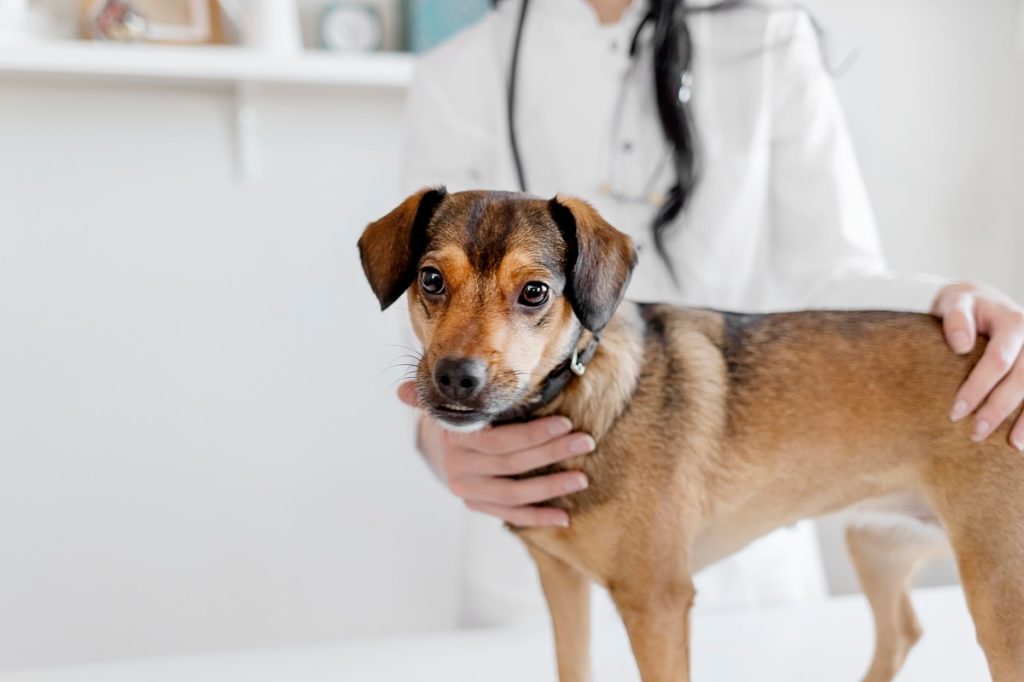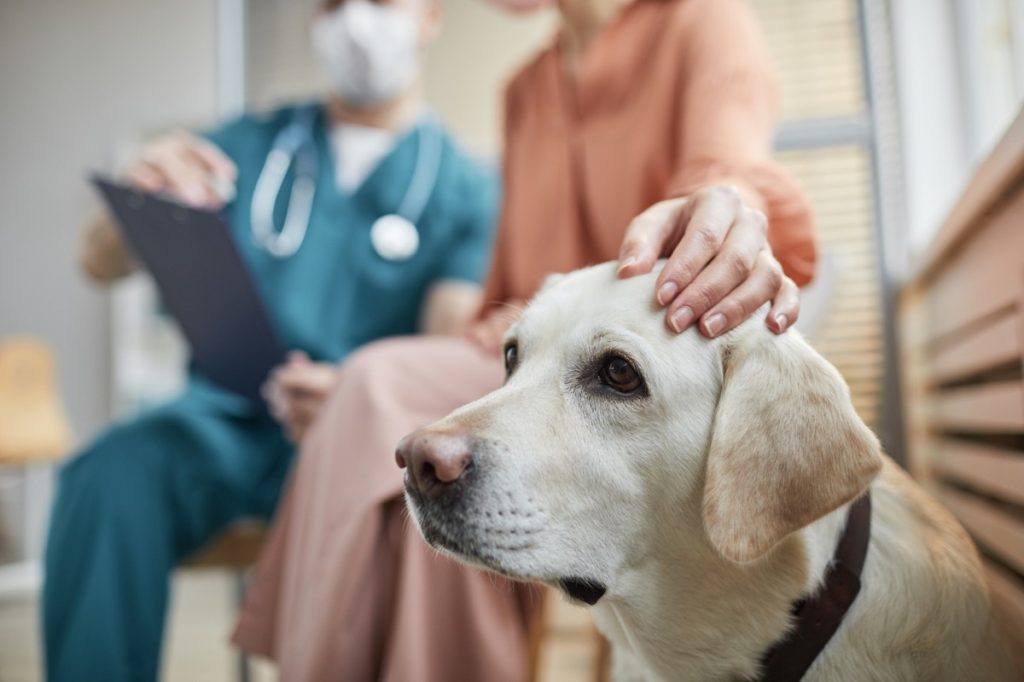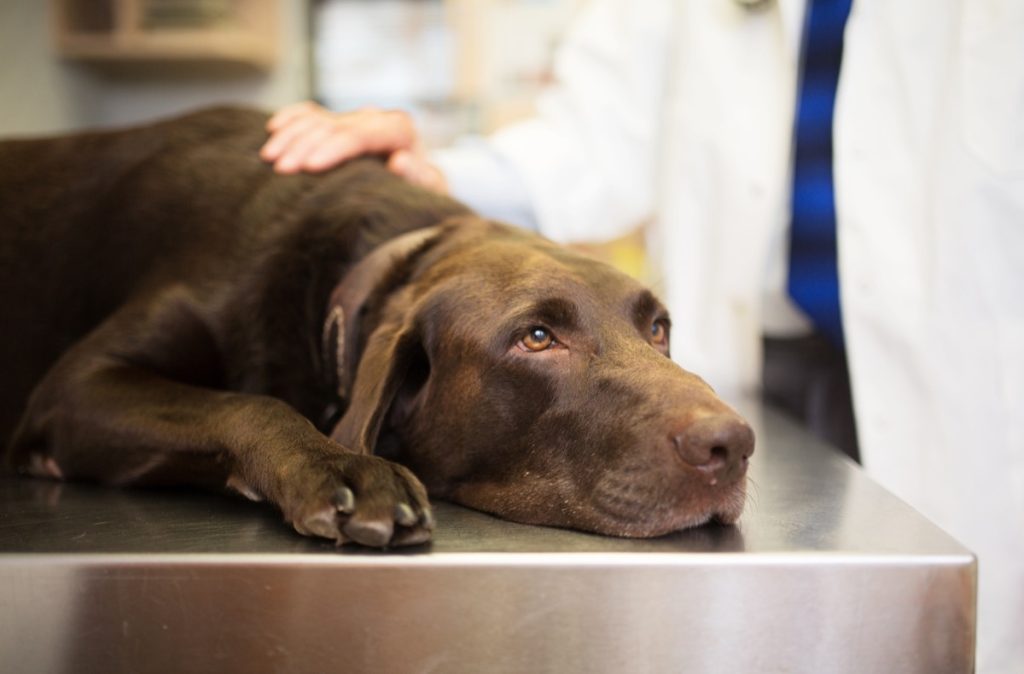Why Is My Dog Shaking? Veterinarians Weigh In

Keeping an eye on your dog’s health can be challenging. Even if you watch what they eat and make your home safe for them, there’s still always a chance of them getting sick or hurt. Spotting and treating an issue with your dog can come down to noticing a symptom or a change in their behavior. In some cases, however, the cause may not be immediately clear. For example, if you’ve observed your dog trembling, there could be several possible reasons for that. So if you’ve ever asked yourself, “Why is my dog shaking?,” read on. Best Life asked veterinarians to weigh in.
RELATED: What Human Foods Can Dogs Eat? 9 Treats You Can Safely Share With Your Pet.
Should I Be Worried That My Dog Is Shaking?

It’s one thing to see dogs shake themselves off when they’re wet or have something in their ears. But it’s another thing when a dog’s shaking appears to come out of nowhere or happens for no reason at all.
“Shaking and trembling are fairly nonspecific symptoms that can be attributed to a number of diverse conditions affecting different body systems,” says Rebecca Greenstein, DVM, veterinary medical advisor for Rover.
A trip to the vet can often help in ruling out common canine maladies such as ear infections or motion sickness. But if you notice your dog shaking even when there isn’t an apparent cause, it can be easy to feel confused or helpless.
RELATED: 10 Dog Breeds That Bark the Most, According to Veterinarians.
7 Reasons Why Your Dog Is Shaking

According to vets, there are plenty of reasons for shaking, which can range from a primary emotional or physical reaction to a serious medical issue. But there could also be more immediate emergencies causing your dog to shake that require them to see a veterinarian immediately.
Because of this, it’s important to pay attention to your pets’ behavior, check for any other symptoms, and take note of their surroundings to try and determine what the cause may be. Some of the most common explanations of why your dog is shaking tend to fall into the following categories:
1. Feeling cold
Perhaps not surprisingly, not keeping your dog warm is a fairly common reason for them to shake.
“Young puppies, elderly dogs, and those who are thin or sparsely coated can be particularly susceptible to the effects of low temperatures, and many dogs shiver when they are cold,” says Greenstein. “Because shaking can also sometimes be a sign of concern in these individuals, it’s best to check with your vet to rule out other conditions if trembling persists even after your pet is bundled up and cozy.”
Size can also make them more susceptible. “Smaller dogs with smooth coats—especially dog breeds like Miniature Pinschers, Dachshunds, and Chihuahuas—are more prone to being affected by temperature changes and may benefit from a sweater to calm the shakes,” says Lorraine Rhoads, director of health and safety for Dogtopia.
If you notice your dog shivering, Greenstein suggests getting them bundled up with a sweater or coat, especially if spending time outdoors in colder weather.
2. Excitement, stress, or fear
Vets also point out that basic emotions such as excitement, stress, and fear can also cause trembling in dogs. Typically, they will calm down after the first few moments of glee they experience when their owners return home. But shaking could also be a sign that they’re timid or feel like they’re in danger.
“If your pup is shaking after hearing a crack of lightning or when you pull into the veterinary clinic’s parking lot, your pup is telling you they’re feeling stress or fear,” Rhoad tells Best Life. “If you suspect that your pup’s shaking or trembling is a symptom of anxiety, check in with your vet or trainer to help identify the cause of that anxiety.”
She explains that a recent survey found that the top three causes of fear and anxiety in dogs are noise sensitivity caused by sounds including fireworks and thunderstorms; separation from their pet parent; and encountering strangers, other dogs, or new situations. If your dog’s shivering isn’t explained by these stimuli, there might be something else at play.
3. Ingesting toxins

Most pet owners go to great lengths to make sure there’s nothing lying around their homes that could be potentially harmful to their canines. But despite their best efforts, one of the more common causes involves the nightmare scenario of your pup eating something it shouldn’t.
“Ingestion of certain poisons can manifest as shaking, trembling, tremoring, and even difficulty standing or walking, along with other symptoms,” says Greenstein. “Some pesticides, human medications, street drugs, and even garden or house plants can cause shaking as well as other clinical signs.”
It can even be seemingly harmless foods that cause problems. “Dogs that ingest toxic levels of chocolate (especially dark chocolate), caffeine, or xylitol—a sugar substitute that can sometimes be found in foods we mistakenly hand to our pets like peanut butter—will shake,” warns Rhoads.
4. Epilepsy
Tragically, some trembling in dogs could the sign of a more serious medical situation. According to Nell Ostermeier, DVM, veterinary advisor at Figo Pet Insurance, if a dog shakes violently along with seizures, it could be a sign of epilepsy—which should be considered an emergency.
But that’s not the only potential cause: Tremors in dogs could also stem from any number of other neurological conditions, too.
“These can be due to conditions affecting the brain, nerves, and/or muscle,” says Greenstein. “Often, these movements are jerkier and more obvious than subtle shaking and can be accompanied by other symptoms like confusion, incoordination, or loss of consciousness.”
Fortunately, even seizure disorders and similar conditions can often be treated with medication.
5. Generalized Tremors Syndrome
If you notice your dog shaking, it might also have to do with another, lesser-known type of canine ailment.
“Generalized Tremors Syndrome (GTS) can also happen in dogs of any size or breed,” Ostermeier says. “Symptoms usually are noticed between one or two years of age, and the cause is unknown.”
While all dog breeds can experience GTS, most veterinary literature notes that pets with a white hair coat are most often afflicted, including Maltese and West Highland white terriers. Though the condition is often misidentified as anxiety, a proper diagnosis can help immensely in recovery.
“If seen by a veterinarian and properly treated, symptoms in affected dogs can resolve within a week,” says Ostermeier.
6. Canine distemper
Like with any newborn, the first few months of a dog’s life are a time when they’re vulnerable to serious infections. And one common culprit in particular can explain why some young puppies begin trembling.
“Canine distemper, a viral disease that is prevented by vaccination, can cause puppies or unvaccinated dogs to shake,” says Ostermeier.
According to the American Veterinary Medical Association (AVMA), the contagious and serious disease attacks the respiratory, gastrointestinal, and nervous systems of an infected dog. It can cause other symptoms, including discharge from the eyes and nose, fever, coughing, lethargy, reduced appetite, vomiting, and diarrhea. Neurological symptoms can also appear, such as walking in circles, being unable to follow a straight path, head tilt, lack of coordination, muscle tremors, convulsions with jaw-chewing movements known as “chewing gum fits,” drooling, seizures, and even partial or complete paralysis.
7. Age-related arthritis or other injuries
Unfortunately, like humans, canines tend to develop more medical ailments as they age. The earliest signs of trembling could be the first signifier that they’re entering another phase of life.
“As dogs near their senior years, they may become weak in the hind legs and shake, but it also could be a sign of pain,” says Ostermeier. “Many senior dogs suffer from arthritis, just like people.”
However, young dogs aren’t immune to joint aches and muscle tremors. “Dogs will often shake or tremble as a sign of discomfort,” says Greenstein. “In fact, dogs who have sore bellies may shake while lying still or when picked up by their owners.”
RELATED: Cesar Millan Says You Should Never Walk Behind Your Dog—Here’s Why.
When Should I Take My Dog to the Vet for Trembling?

One of the most difficult questions that comes with caring for your pet is deciding whether or not to take them in for medical care. And while each case is different, choosing to do so at times when your pet may be feeling anxiety or stress can still help determine if something more serious could be affecting them.
“The shaking your pup is experiencing is a cue for you, as their care provider, to address the root cause,” Rhoads says. “Don’t hesitate to contact your vet or a dog trainer for support.”
Scenarios in which you have reason to believe your dog has been poisoned require a more immediate response. “If you notice abnormal behaviors and suspect your dog has ingested something dangerous, proceed directly to your local veterinary emergency clinic,” Greenstein suggests. She adds that you should also do this if your pet experiences violent shaking and seizures or trembling with other symptoms.
And if you think your elder pup might be suffering from age-related shakes, be sure to talk with your veterinarian about the signs. “They will be able to help determine whether a pain management plan or other options would be helpful for your dog,” Ostermeier says.
Conclusion
Of course, it can be distressing when your dog begins trembling. After all, it’s only natural to want to treat any problem or pain they appear to be suffering from.
The potential causes for dog shaking range from everyday shivering and excitement to potential poisoning and serious medical conditions like epilepsy. That’s why Ostermeier, Rhoads, and Greenstein agree that any prolonged trembling is enough cause for concern to bring your pet to the veterinarian for a check-up to get to the root of the problem.
If you’re struggling to understand why your dog may shake, there’s never harm in seeking professional input. Hopefully, it will help put both you and your beloved pet at ease and initiate the proper course of treatment.